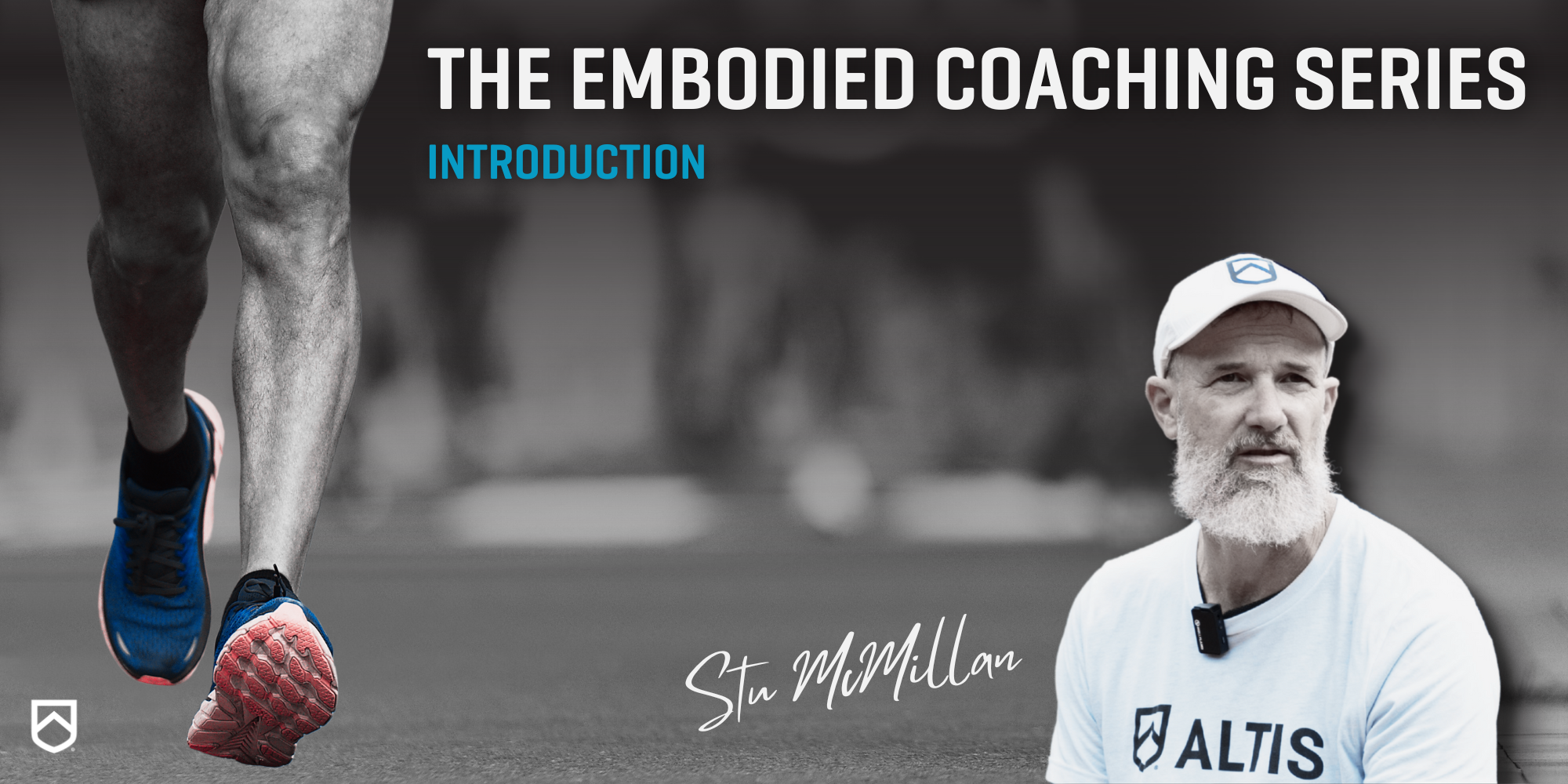Foreword
In November 2019 I was reminded of what I’ve come to believe as a coach: there’s an entire dimension beneath the metrics we obsess over.
This is the essence of “embodied coaching,” an approach that values the interconnection of mind, body, and emotion in every athletic pursuit.
Over the course of this series, I’ll introduce you to the foundations of embodied coaching—how it works, why it matters, and how it can elevate both performance and personal fulfillment. We’ll delve into unique movement patterns, the role of emotions in competition, and the art of fostering deeper awareness in athletes of all levels.
Thank you for joining me, and I hope you find inspiration and insight in this series articles—whether you’re a fellow coach, an athlete, or someone who simply values the power of movement.
Together, we'll explore a more holistic way to coach and compete, one that honors the humanity at the heart of sport.

Introduction: Movement as an Embodied Practice
In November of 2019, I stood among the crowd at the New York City Marathon, cheering on my 73-year-old father as he tackled 26.2 miles.
By that point in my coaching career, I had coached at 10 Olympic Games, worked with over 70 Olympians, and helped athletes win 35 Olympic medals. None of that compared to what I witnessed that day.
Watching my father cross the finish line after five hours was incredible, but it wasn’t just about him or his accomplishment. It was the energy of the entire event—the way the marathon transformed not only the runners but also the city itself. Over 1 million spectators lined the streets, cheering, supporting, and celebrating strangers and loved ones alike.
This wasn’t about medals or records. It was about connection.
That experience hit me like nothing else. It reminded me—or perhaps made me realize for the first time in years—that sport is so much more than the measurable outcomes we often obsess over. Sure, helping an Olympian win a medal is rewarding, as is consulting on the return to play of a professional football player—but sport is more than that, isn’t it?
At its best, it’s about helping people—young or old, elite or recreational—connect with themselves, their movement, and each other.
For my father, running that marathon wasn’t about how fast he could run, or what place he came in; it was about what the experience meant to him. It was about the way movement—his movement—helped him grow, adapt, and find purpose at 73 years old. Watching that, I saw the essence of embodiment: movement as a way of being, not just doing.

This idea—that movement is more than mechanics, that it is an expression of who we are—has shaped everything I believe about coaching. Sport, at its core, is about transformation. And our role as coaches is not just to help athletes win races or improve their form but to guide them toward deeper connections—with themselves, their craft, and the world around them.
This perspective isn’t new, but it often gets lost in the pursuit of results.
After returning from New York City, I began to reflect more deeply on the transformative nature of sport, and I found myself drawn to ideas that could help me articulate what I was seeing and feeling. I was reminded of Maxine Sheets-Johnstone's The Primacy of Movement and the conversation between her and J.A. Scott Kelso on YouTube that I had watched many times before.
Returning to their work, I realized she was articulating ideas I had been circling around for years as a coach. I was struck by how deeply movement is connected to who we are. Sheets-Johnstone’s insights into the primacy of movement resonated with my experience—that movement is not just a mechanical action but a fundamental way of being in the world.
As someone who has always enjoyed philosophy, these ideas have profoundly shaped how I think about coaching. Movement in sport is often reduced to its measurable components: in sprinting, it’s ground contact time, flight time, step length, and step frequency. While these metrics matter, they offer only a partial view. This reductionist approach treats the body as a machine to be optimized—a series of levers, pulleys, and forces. But this perspective misses something fundamental: movement in sport—and in life—is not merely mechanical; it is an embodied act—a seamless interplay between mind, body, and emotion.
Traditional coaching tends to adopt a dualistic mindset, where the body is separate from the mind. Athletes are often seen as objects to be controlled, refined, and directed according to external standards. In this model, success is dictated by how well an athlete conforms to predetermined ideals. But what if this approach limits the athlete’s potential?

A more holistic perspective shifts the focus. Drawing on phenomenological philosophy, particularly the work of Husserl and Merleau-Ponty, we see the body not as a machine but as a lived experience.
Phenomenology, in simple terms, is the study of how we experience the world through our bodies, emphasizing perception, sensation, and the interconnectedness of mind and body. The body is the medium through which athletes encounter the world. Movement isn’t just something they do; it’s a way of being. When we recognize this, coaching becomes less about imposing solutions and more about guiding athletes to discover their own.
Dance coaches and educators like Sheets-Johnstone, Isadora Duncan, Laban, and Minton and Faber have long understood that physical expression fosters deep cognitive and emotional connections. Why wouldn’t the same hold true for other sports? When athletes feel their movements, understand their bodies, and connect emotionally to their efforts, they unlock performance in ways that transcend mechanical limitations.
In contrast to a reductionist, mechanistic approach, an embodied perspective encourages athletes to explore their unique physicality. When we continually force athletes to move in ways that do not align with their true nature—their emotional and cognitive selves—they may lose a sense of ownership, creativity, and connection to their movement. Over time, this can lead to frustration, decreased motivation, and even burnout as they feel disconnected from the act of movement itself, whether in sport or daily life.

A more holistic perspective shifts the focus. Drawing on phenomenological philosophy, particularly the work of Husserl and Merleau-Ponty, we see the body not as a machine but as a lived experience.
Phenomenology, in simple terms, is the study of how we experience the world through our bodies, emphasizing perception, sensation, and the interconnectedness of mind and body. The body is the medium through which athletes encounter the world. Movement isn’t just something they do; it’s a way of being. When we recognize this, coaching becomes less about imposing solutions and more about guiding athletes to discover their own.
Dance coaches and educators like Sheets-Johnstone, Isadora Duncan, Laban, and Minton and Faber have long understood that physical expression fosters deep cognitive and emotional connections. Why wouldn’t the same hold true for other sports? When athletes feel their movements, understand their bodies, and connect emotionally to their efforts, they unlock performance in ways that transcend mechanical limitations.
In contrast to a reductionist, mechanistic approach, an embodied perspective encourages athletes to explore their unique physicality. When we continually force athletes to move in ways that do not align with their true nature—their emotional and cognitive selves—they may lose a sense of ownership, creativity, and connection to their movement. Over time, this can lead to frustration, decreased motivation, and even burnout as they feel disconnected from the act of movement itself, whether in sport or daily life.

GET THE WHOLE EMBODIED COACHING SERIES DELIVERED TO YOUR INBOX - TOTALLY FREE
Ready to transform the way you coach—and the way your athletes experience sport?
Sign up below to receive the complete 6-part Embodied Coaching Series—delivered straight to your inbox, one article at a time.
Each part offers practical insights, real-world examples, and a fresh perspective on what it means to coach the whole athlete.
Here’s a quick preview of what you’ll learn:
- Recognizing and Supporting Individual Movement Patterns
- The Emotional Dimension of Movement
- Coaching to Enhance Rather Than Overwrite
- What We Can Learn from the Successful “Non-Expert Coach”
- Rethinking Success: Measuring Progress in Embodied Coaching
- Conclusion – Embracing Embodied Coaching as a Philosophy and Practice
Join us for the next 6 days—and learn how far a deeper connection to movement, mindset, and meaning can take you.

